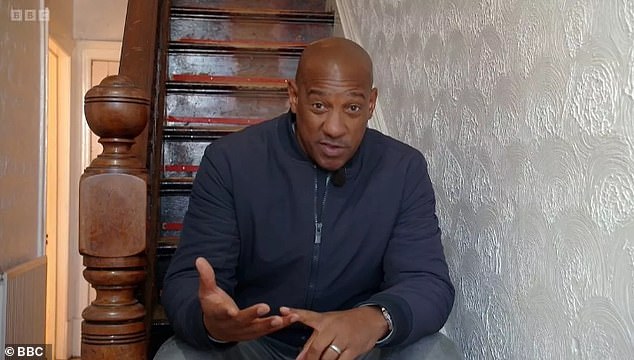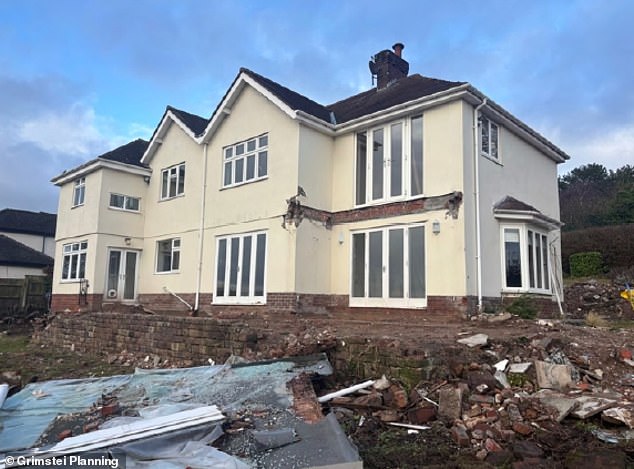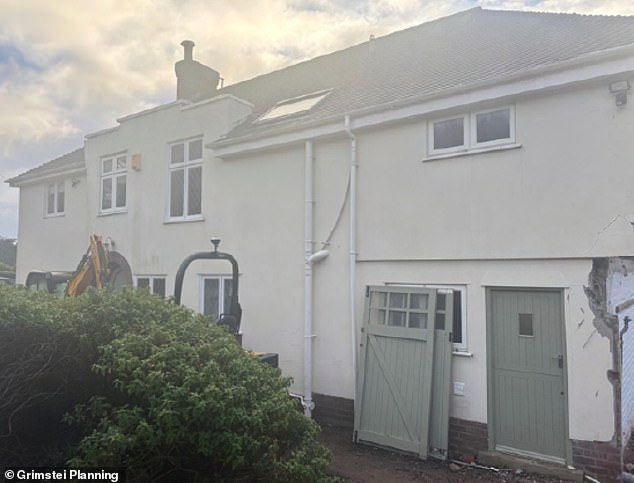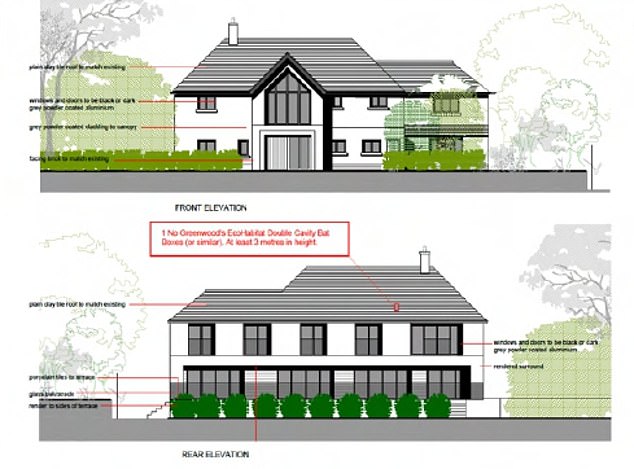Homes Under the Hammer presenter Dion Dublin has been given the green light to demolish his run-down mansion and build a series of luxury homes.
The ex-Celtic and Manchester Utd forward, 56, splashed out £1.24million on a mansion in the upmarket village of Caldy, on the Wirral Peninsula, in Merseyside last year with his wife Cheryl.
He had originally planned to renovate the run down property with Wirral Council giving him the go-ahead to take the house back to its former glory.
But after some investigations Dublin decided to level it and start from scratch after the Aston Villa striker said the ‘poor physical condition’ of the 1930s building meant it would be cheaper and easier to build a new property.
The new house will include a cinema room, large kitchen diner with pantry, plus games and play rooms for the couple’s five-year-old daughter Ruby on the ground floor, and five en-suite bedrooms and a laundry room upstairs.
New gate pillars will be installed at the entrance but the existing large hedgerows will be kept ‘to retain the natural sense of enclosure which is enjoyed’, the application says.
There will be off road spaces for at least three cars, including electric vehicle charging and cycle parking, and a 715sqm garden accessed via a tiled terrace and steps.
Specialist bat boxes will also be installed on the outside walls after four different species of the protected animal were sighted either emerging from the eaves of the house or foraging in the garden during surveys last summer.

Homes Under the Hammer presenter Dion Dublin has been given the green light to demolish his run-down £1.2m mansion and build a series of luxury homes (pictured on the show)

The ex-Celtic and Manchester Utd forward, 56, splashed out £1.24 million on a mansion in the upmarket village of Caldy, on the Wirral Peninsula, in Merseyside last year with his wife Cheryl
Bats are a protected species under UK law and it is illegal to kill, possess or handle them without a licence or to cause them harm or disturb their habitat in any way.
Experts visited the property and a special bat licence would be needed if any of the mammals are discovered.
The plans also state that the replacement home would not overlook or create any ‘loss of privacy issues’ to existing neighbouring properties.
The application that has now been given the green light and the family claim the new house better reflects the family’s ‘needs and aspirations.’
It has been designed in order to ‘create a quality new living environment’ while maintaining ‘a sympathetic appearance within the street scene,’ it says.
The plans also state that the replacement home, which has impressive views over the River Dee estuary and north Wales and is just five minutes’ walk to the nearest beach, would not overlook or create any ‘loss of privacy issues’ to existing neighbouring properties.
Dublin, who moved into punditry and television work after retiring from football, previously revealed how he was asked to present Homes Under the Hammer when the BBC discovered he had set up a building firm after he finished playing.
He said: ‘(They) said, ‘”Do you fancy walking around an empty house in Salford and telling us what you think of it?” And that’s basically what happened.

Dublin has decided to level the house and start from scratch after the Aston Villa striker said the ‘poor physical condition’ of the building meant it would be cheaper to build a new property

The new house will include a cinema room, large kitchen diner with pantry, plus games and play rooms for the couple’s five-year-old daughter Ruby
‘I walked around an empty house in Salford with a cameraman, had a look around and I said what I would do if it was mine. They liked it and there you go, that’s how I’ve got onto Homes Under the Hammer.’
Dublin, who married wife, Cheryl, in 2017, is also currently a director at former club Cambridge United.
During his playing days he also had spells with Manchester United, Coventry City and Aston Villa before retiring and moving into broadcasting.
Wirral Council said: ‘The proposed development for the erection a replacement dwelling is not considered detrimental to the character of the wider street scene and is acceptable in terms of scale and design.
‘The development is also not considered to have an adverse impact on the amenities which the occupiers of the neighbouring properties can reasonably expect to enjoy and provides sufficient residential accommodation for the enjoyment of future occupiers.’











